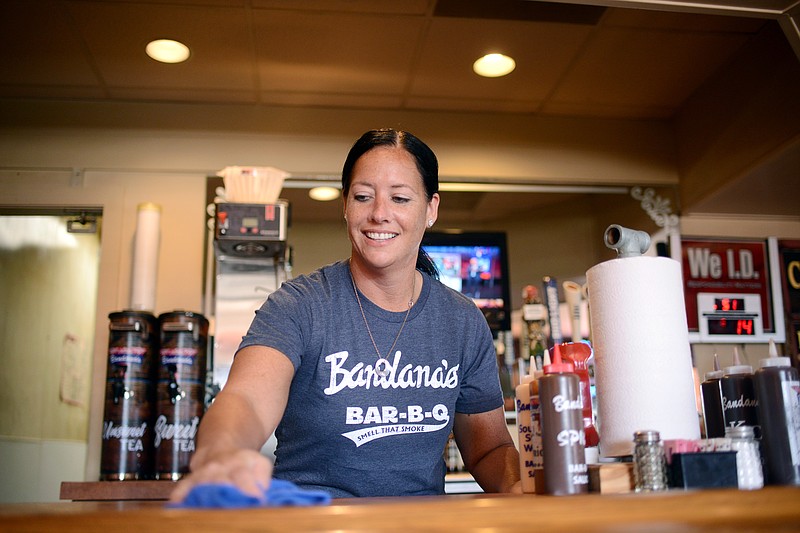For 40 hours a week, Gabby Jahr is a business analyst for the Missouri Office of Administration.
But for another 10-20 hours each week, the 35-year-old is a waitress and an Uber driver.
Jahr represents a small percentage of Americans who work side jobs, sometimes called "side hustles," to help ends meet financially or to create opportunities to explore other career areas.
A 2017 Bureau of Labor Statistics report estimated 4.9 percent of Americans held multiple jobs like Jahr.
Before she started working full time for the state five years ago, Jahr spent eight years working at Bandana's Bar-B-Q. Even when she started working 40-hour weeks, she decided to keep a part-time job at Bandana's.
Then, about a year ago, she started driving Uber part time, too. Jahr, a single mother of four, said her main job gives her benefits and stability, but she needs the extra income her side jobs supply.
In May 2019, the Census Bureau released data from 2013 compiled by the Survey of Income and Program Participation, a nationally representative panel survey that collects information on the short-term dynamics of employment, among other things.
The SIPP found, of 158.1 million employed, 8.3 percent held multiple jobs - defined as holding a main job and at least one other job for longer than a week. Of those, 6.9 percent reported holding three or more jobs.
Women were more likely to hold multiple jobs in 2017, with 5.3 percent of women holding multiple jobs compared to 4.6 percent of men, according to the Bureau of Labor Statistics. Black or African American workers were slightly more likely to hold multiple jobs, at 5.3 percent compared to 5 percent of white workers, 3.4 percent of Hispanic or Latino workers, and 3.2 percent of Asian workers.
The Federal Reserve Bank of St. Louis found that in July 2019, 5.3 percent of Missourians worked multiple jobs - the first time the number has been over 5.2 percent since April 2009, when it hit 5.5 percent
Multiple jobholders may work one full-time job and one or more part-time jobs, like Jahr, or just one or more part-time jobs. Others may own their own business and supplement their income with another job.
Unlike Jahr, 73.8 percent of men and 66.1 percent of women worked their multiple jobs in the same industry, with 75.1 percent of men and 69.3 of women holding two jobs in the same occupation, according to the SIPP.
Ronnie Waters, 47, owns and operates two businesses - Waters Sound & Light, an entertainment business that provides event staging and lighting, and Tax Break, a tax preparation service.
Between the two, he works 50-60 hours a week either setting up events or working on tax planning and accounting.
Waters said it helps, when you're balancing multiple jobs, to enjoy the work you're doing.
"I've been fortunate to be where I'm at because most people don't fall into place like I have," he said. "If you enjoy what you do, it's not work."
Jahr said one of the reasons she stayed on at Bandana's even after starting full time with the state is because she enjoyed it.
"It doesn't really feel like work, whenever you're having a good time and you work for good people," Jahr said.
To balance her three jobs, four children and volunteering time as the outreach coordinator for Building Community Bridges, Jahr found that driving Uber is a good side job. She's able to choose her own hours, and said she'll often clock in while her children are busy with practices or activities.
"I've always been a busy body," she said. "I can't just sit at home. I've never been the type, so it's like, I might as well make money while I'm out."
Being able to stay busy is both a pro and a con of working multiple jobs for Jahr. She likes that working so many hours keeps her active and stops her from sitting at home, but that can be a drawback, too.
"Sometimes I do feel like I just never have free time, to just have a day where I can just lay around and not have any responsibilities," Jahr said.
For Waters, in the past, working too much had a negative effect on his health.
"Your body needs time to stop and rejuvenate. If you don't do that, you get all kinds of health issues," Waters said. "I've even had a few myself, and the doctors said, 'You really need to cut down how many hours you're working.' I used to put in 80 or 90 (hours) a week, regularly, seven days a week."
Despite the obstacles, Jahr said she, like many people, doesn't really have the option to only work one job, especially as a single parent.
"I think the big thing, for people to make ends meet, you don't really have a choice," Jahr said. "You have to work multiple jobs. Especially being single. I don't think the world is set up for single people."
In December 2013, the multiple-job holding rate was higher for those who were widowed, divorced or separated, at 5.6 percent, compared to single people, at 5.3 percent, or married people at 4.7 percent.
When asked if they would rather have the option of working one job instead of multiple, Jahr and Waters agreed they would but would likely still fill their time with either side jobs or volunteering.
"In a perfect world, I would rather be financially able to just have one and make really great money and not have to depend on another job," Jahr said. "But at the same time, I don't think it would matter how much money I make, I would still be doing other jobs or volunteering, or something to not just better myself but better the world."

